 MyDogBreeds
MyDogBreeds Karelian Bear Dog is originated from Finland but Beagle-Harrier is originated from France. Karelian Bear Dog may grow 10 cm / 4 inches higher than Beagle-Harrier. Both Karelian Bear Dog and Beagle-Harrier are having almost same weight. Both Karelian Bear Dog and Beagle-Harrier has same life span. Both Karelian Bear Dog and Beagle-Harrier has almost same litter size. Both Karelian Bear Dog and Beagle-Harrier requires Moderate maintenance.
Karelian Bear Dog is originated from Finland but Beagle-Harrier is originated from France. Karelian Bear Dog may grow 10 cm / 4 inches higher than Beagle-Harrier. Both Karelian Bear Dog and Beagle-Harrier are having almost same weight. Both Karelian Bear Dog and Beagle-Harrier has same life span. Both Karelian Bear Dog and Beagle-Harrier has almost same litter size. Both Karelian Bear Dog and Beagle-Harrier requires Moderate maintenance.
 The Karelian Bear Dog is a Finnish Spitz-type dog who is regarded as a national treasure in the country. They have always been noted for their hunting skills, and because the dog has been found in ancient Viking graves you can assume it is an ancient breed.
The Karelian Bear Dog is a Finnish Spitz-type dog who is regarded as a national treasure in the country. They have always been noted for their hunting skills, and because the dog has been found in ancient Viking graves you can assume it is an ancient breed.
In fact the ancestry of the dog can be traced to neolithic times, when dogs followed human settlers to regions of Scandinavia and Europe.The American Kennel Club does not fully recognize the Karelian Bear Dog. It is however included in their Foundation Stock Service.
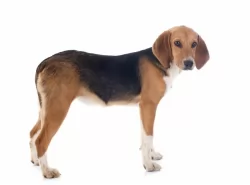 The Beagle Harrier, the breed that was made mixing the France Scent Hounds and a Beagle.
It is not quite sure if this breed was made on purpose or the mix of the breeds happened and resulted in a great dog so the breeding continued.
Since they are not large dogs as hounds, they are used to hunt small animals.
The Beagle Harrier, the breed that was made mixing the France Scent Hounds and a Beagle.
It is not quite sure if this breed was made on purpose or the mix of the breeds happened and resulted in a great dog so the breeding continued.
Since they are not large dogs as hounds, they are used to hunt small animals.
This first breeding took place in England, but after the 14th century, they were breed on purpose in France.
 Standing at between 54–60cm in height and weighing roughly 20–23 kg, the medium sized Karelian Bear Dog has a beautiful shiny coat. The outercoat is shortish, straight and dense and the undercoat is soft and thick.
Standing at between 54–60cm in height and weighing roughly 20–23 kg, the medium sized Karelian Bear Dog has a beautiful shiny coat. The outercoat is shortish, straight and dense and the undercoat is soft and thick.
The color of the coat is black with white markings. The dog has a bushy tail which curls in a circle over the back and the tail’s end is white. The ears of the dog are small and erect while the small eyes are intense.
It is best to have your Karelian Bear dog trained and socialized as he can tend to be aggressive towards other pets in the house, and even towards people he isn't familiar with. The owner of these dogs must be firm and fair with training as the Karelian is a strong-willed dog.
He is devoted to his human owners while being somewhat aloof and unfriendly with strangers. They are very territorial.
He is a very social dog and just loves spending time outdoors with his family. He is also good with children in the home as he is a playful dog.He is a dog who is going to require a lot of space to use up his energy. He needs a lot of mental and physical stimulation, as in the past he has always had a lot of work to do, and just loves being active. He is a confident, brave dog who takes his job as family protector seriously.
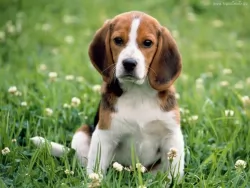 The Beagle Harrier is a scent hound that is described as a big sized Beagle or a small sized Harrier. This breed was developed from this two breeds, actually. Despite the looks of these breeds, the Beagle Harrier is an energetic kind of dog who gets very attached to his family. This medium sized pet comes in variations of colours and they are usually tricoloured. They usually have dark coloured eyes, white paws, and They usually grow up to have a very muscular body, but, if you don’t provide them with the daily activity they need, they will quickly get obese and unhappy.
The Beagle Harrier is a scent hound that is described as a big sized Beagle or a small sized Harrier. This breed was developed from this two breeds, actually. Despite the looks of these breeds, the Beagle Harrier is an energetic kind of dog who gets very attached to his family. This medium sized pet comes in variations of colours and they are usually tricoloured. They usually have dark coloured eyes, white paws, and They usually grow up to have a very muscular body, but, if you don’t provide them with the daily activity they need, they will quickly get obese and unhappy.
 Your energetic Karelian Bear Dog isn’t recommendeded for life in the city in a small garden. He needs a large garden or farm where he can run far and wide.
Your energetic Karelian Bear Dog isn’t recommendeded for life in the city in a small garden. He needs a large garden or farm where he can run far and wide.
Exercising him will be an important part if you own one of these dogs. He is a social, friendly, active family pet who happens to make a good watchdog too.
Make sure you have your Karelian Bear Dog trained and socialized and he’ll make you a wonderful friend and pet.
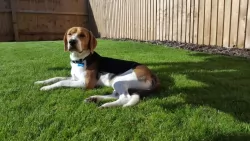 The Beagle Harrier, if trained properly and socialized while he was still a pup, will be the great playmate for any child. They get along with strangers, as well. We might say that they will get along with anybody who is ready to run and play with him. Children are most likely that kind of playdate, so it appears that they like children more. The Beagle Harrier is a great family pet, and he is great with babies, toddlers, teenagers… so don’t be afraid to leave the dog alone during the playdate!
The Beagle Harrier, if trained properly and socialized while he was still a pup, will be the great playmate for any child. They get along with strangers, as well. We might say that they will get along with anybody who is ready to run and play with him. Children are most likely that kind of playdate, so it appears that they like children more. The Beagle Harrier is a great family pet, and he is great with babies, toddlers, teenagers… so don’t be afraid to leave the dog alone during the playdate!
hunting, scent tracking, search dog
Some will say that the Beagle Harrier is one of the most desirable pets because of his loving and lively nature. They get along with almost anyone and they don’t mind living indoors if you have the time to take him out for a daily run each day. They will do great in a large group of people and any public places so you can take your Beagle Harrier with you anywhere you go.
Since the Beagle Harrier is placed in a group of the hound dogs, you must be aware that he will have the attitude of the pack leader. Once you got the Beagle Harrier puppy, you must start training and socializing him in order to grow the pet that will be easy to handle and accepted by the family and all the people around you, even strangers. They are very intelligent and they have a calm nature so they will be quite easy to train.
 The Karelian Bear Dog can reach 10 to 12 years of age with good care, but just like with other dog breeds, he can be prone to certain health problems such as eye and dental problems as well as hip dysplasia.
The Karelian Bear Dog can reach 10 to 12 years of age with good care, but just like with other dog breeds, he can be prone to certain health problems such as eye and dental problems as well as hip dysplasia.
Many people don’t realize that dental problems are far more serious than what they imagine. An offensive breath can be the first warning sign of tooth decay with your canine friend.
There are other problems that can develop orally for your dog and these include inflammation of the gums, swollen gums and mouth tumors. You need to brush your pet’s teeth but also see to it that he goes for regular dental check-ups at the vet.
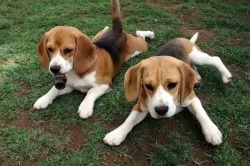 Almost every active dog suffers from joint diseases. Even though it’s generally a genetic disease, you can lower the chances of hip or elbow dysplasia by taking care of your dog’s weight, diet and daily exercise.
Almost every active dog suffers from joint diseases. Even though it’s generally a genetic disease, you can lower the chances of hip or elbow dysplasia by taking care of your dog’s weight, diet and daily exercise.
The Beagle Harrier has big ears that are always set down. That makes them ideal for the dirt accumulation, ear irritations and ear infections. Check his ears regularly and clean them at least once a week.
 There are many people who just keep a dog for watchdog purposes and fail to make the pet a proper family member by meeting its physical and emotional needs.
There are many people who just keep a dog for watchdog purposes and fail to make the pet a proper family member by meeting its physical and emotional needs.
Caring for a dog means providing nutritious food and clean drinking water, seeing that he has a warm, dry place to sleep, providing the dog with exercise and ensuring the dog is healthy and content.
Caring for a dog is a big responsibility, and you have to think carefully before you bring a dog into your home and life.
You need to be careful with the food you select for your pet. If you’re feeding him a commercially manufactured food, you need to make sure to read the label and make sure the top ingredients are meat and not meat by-products. If this is something you’ve never thought about, ask your veterinarian for food recommendations.
Speaking of veterinarians, make sure you have a reliable, reputable vet you can call on. At some time or other your pet may get sick and then you want to have the name of a reliable vet in your contacts list on your cell phone. Sometimes your pet can become suddenly sick where he will need immediate, emergency help from the vet.
Just like you look after yourself, you need to look after your pet by brushing him, checking him for fleas, ticks and worms and keeping an eye on his eyes, ears, teeth and general health.
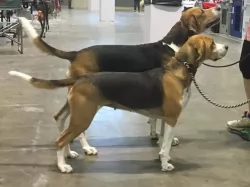 Since the Beagle Harrier is an active dog breed, they will need food for the active dogs. Make sure you provide them with quality food that will give them enough strength to get through the very active day, and not gain too much of the weight. It is very important that you don’t overfeed him because this breed quickly becomes obese. It is advisable to use treats while you train him to do new tricks, but be very careful with the amount you give to the dog.
Since the Beagle Harrier is an active dog breed, they will need food for the active dogs. Make sure you provide them with quality food that will give them enough strength to get through the very active day, and not gain too much of the weight. It is very important that you don’t overfeed him because this breed quickly becomes obese. It is advisable to use treats while you train him to do new tricks, but be very careful with the amount you give to the dog.
Puppies need to be fed only two times a day. Once you decide which brand of food you will use, stick with them until the dog is 6 months old. Make sure they have enough nutrients and the quality ingredients that will help them with growing strong and healthy bones.
If you want Beagle Harrier to grow up in a happy and healthy dog, make sure you provide him with quality food, lots of exercises and unconditional love. They are extremely loving and they get depressed if left alone. Grooming tips are very clear – they need a regular brush because shed a lot. The more you brush, the less hair you will find on your hands during the belly rubs.
If your Beagle Harrier is trained and socialized, the dog park will be the best daily activity for him. If there is no dog park near your house, take him to the bike ride, jogging, swimming, hiking, markets, parks… They love to be off the leash and with people but since they are the hound dogs, don’t be surprised if they get distracted by smelling something more interesting than the ball. They would love to grow up in a house with a large yard, but, if you live in the apartment, make sure that you take time for his daily activity.